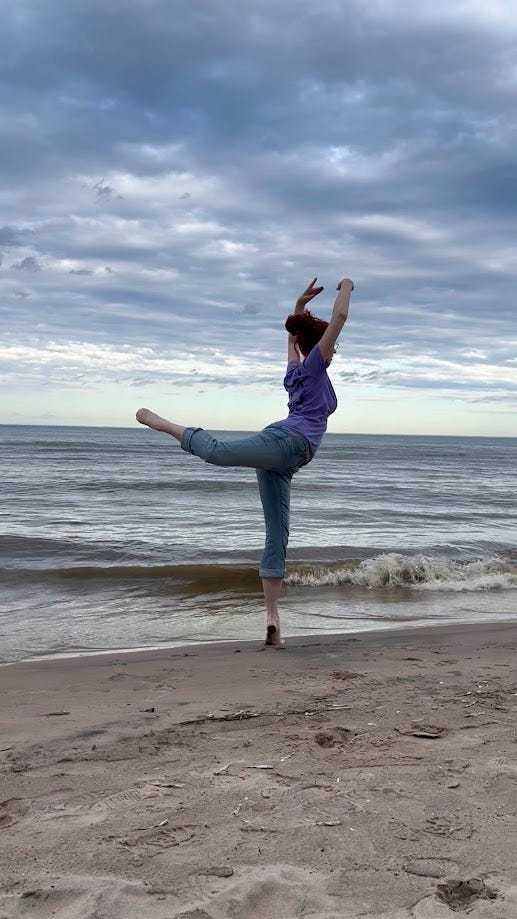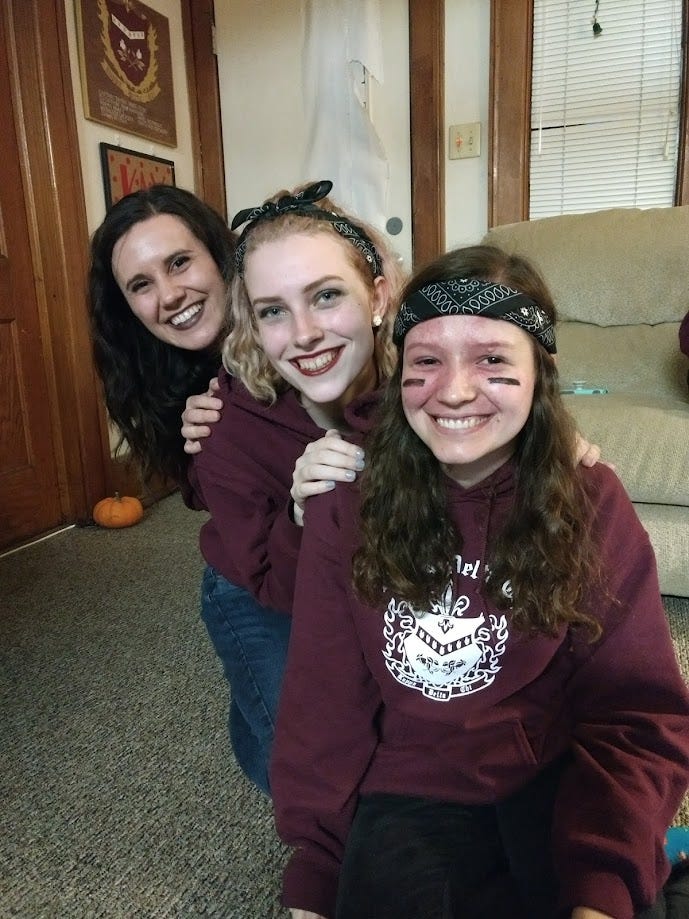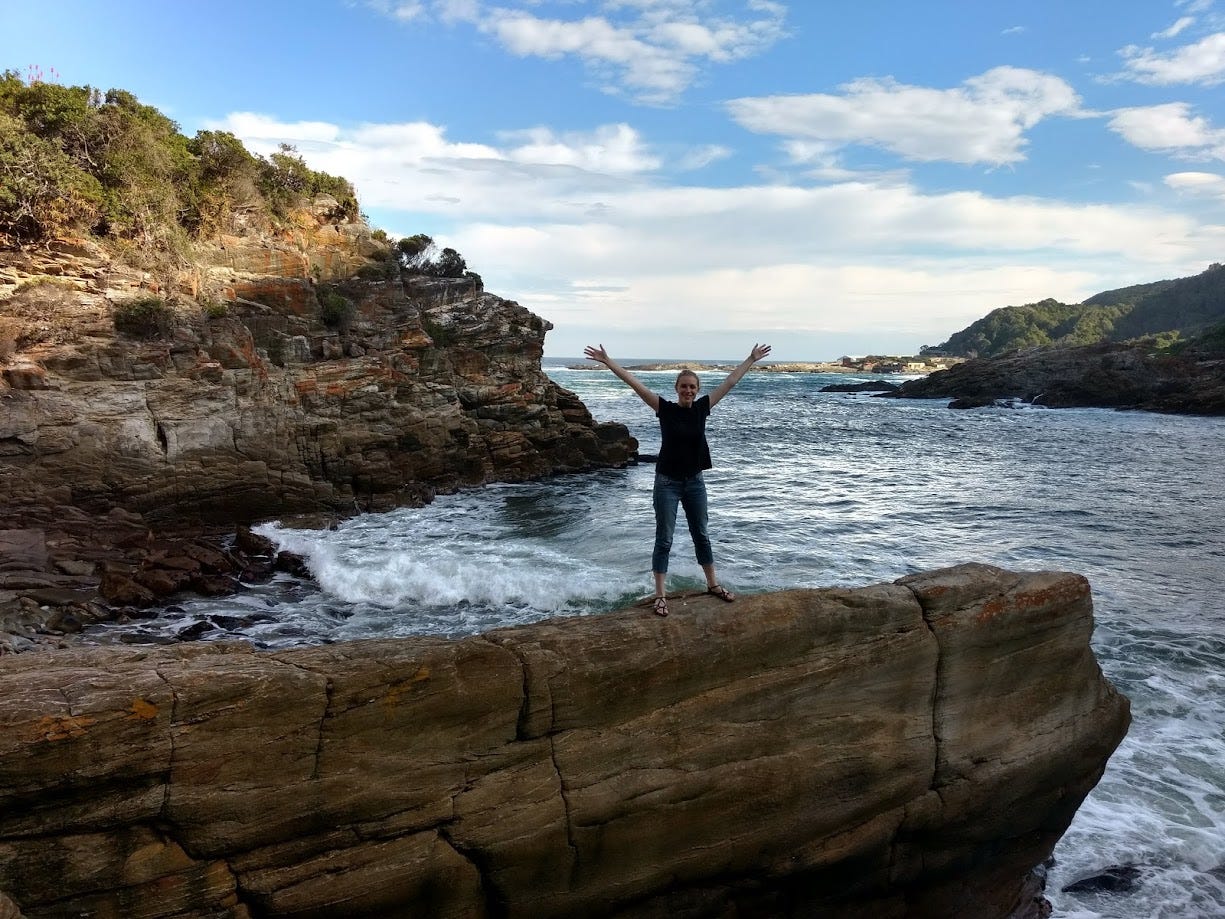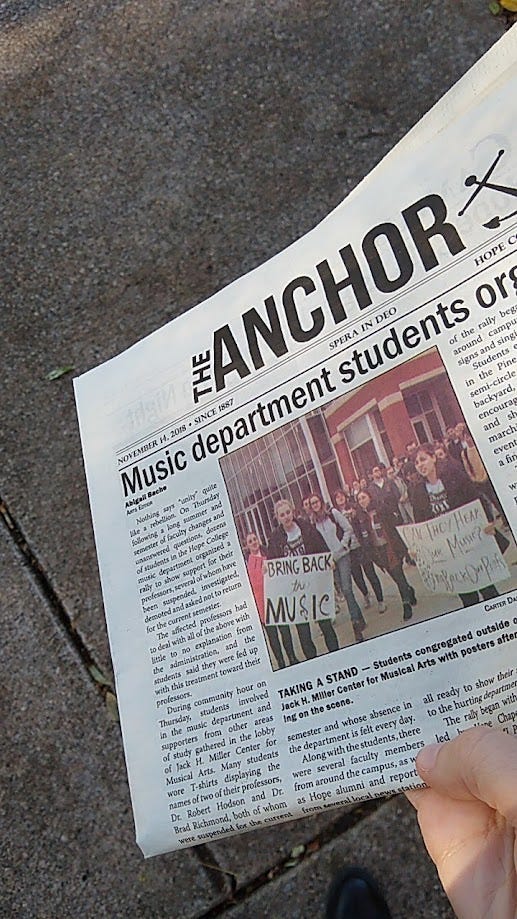the things I learned in college
grilled cheese sandwiches, sorority initiations, and late night donut runs
A lot of what I remember most from college is adjacent to the course material. My English professor (and advisor) was a quirky ex Mennonite recovering from cancer, who wore giant rings and asymmetrical tunics and headscarves, and I remember worshipping her and her general air of knowingness, and her turns of phrase like "isn't that yummy" about a sentence that most humans would absolutely never think to describe as yummy. I don’t recall much about most of the texts, other than The Yellow Wallpaper and A Rose For Emily. (A Rose for Emily is a horrible story about necrophilia, and I only remember it because the paper I wrote for that assignment was my first and only attempt to argue for a point of view I didn't agree with and don't respect, just based on what I could find in the text. I succeeded and wrote a very good paper, and it made me briefly love logic and argument and rhetoric and bullshit, and then I was immediately disgusted by my own power, by the stupidity of it all, by this artform I love so much- and vowed never to do that again.) Another thing this advisor taught me: "Kellyanne, you put things in parentheses that are clearly vital to the text. Parentheses are for extra information- information you could lose. If you couldn't lose it without losing something vital- drop those parentheses!"1 And here I am, still parenthesizing things I shouldn't.
I studied English and French in college, and I am lucky enough to use one of those degrees professionally. I work at a full immersion French international school in Chicago, and speak French every day. It is frequently exhausting. My heart tells me I learned French mostly during my study abroad. This is true in a sense- a semester spent sitting at the kitchen table of my host family, fielding their questions about Trump (round 1) and American culture took my French from elegant theory to awkward hilarious reality. One time I asked my host sister if the dryer was done yet so I could do laundry but I didn't know the word for dryer, so I said machine de sécheresse (literally, machine of dryness) (it is actually called a sèche-linge, aka dry-laundry) and the peals of laughter that echoed through the house burned "sèche-linge" into my brain forever. I was tempted to put this whole laundry anecdote into parentheses, because I was straying from my initial point of "how I learned French". Isn't that funny? Maybe I am still rebelling against my advisor's ideas of what good writing should look like, six years after graduation.
But most of my French was of course learned in classrooms of quiet, unimportant memorizing of the subjunctive and when an adjective goes in front of a noun and when it goes behind. I am sure my teachers made this interesting to me somehow- I don't remember most of it.2 Memories of the teaching and learning have fled and only the subject matter remains- like someone coming and putting a messy room in order and you begin to forget what it looked like before. French feels fluent some days, and like putting on scuba gear on others. Yesterday I was describing our moldy AC unit. I knew the word for AC was clim, had used it in the conversation twice already, and yet I kept fumbling around using the letters AC, couldn't think of the word for mold, used the wrong verb for "wash". This is why I find language levels are mostly bullshit. You're fluent till you aren't, and then oh boy.
One of my other English profs told me to start capitalizing my poetry. This was during the thank u, next and rupi kaur era, and I was allergic to capital letters in a way that lingers to this day. On his advice, against my instincts, I changed the capitalization in a poem that was going to publication, and I have regretted it ever since. I don't even think I would write that poem lowercase now, and I think he was probably correct.3 But I still regret changing it. Isn't that funny? My rebellion against authority, even as I was every teacher's darling. There wasn't an English or French class I stepped into where I didn't do every reading, attend every class, take notes, work wholeheartedly, turn the teacher into God, and then sidle into the role of a nose scrunching Lucifer, determined to find a way to push back against whatever they were telling me. I wanted to be led, to be taught, but I even more wanted to be in charge- to learn to listen to myself.
I had to take one math class in college, to satisfy the gen ed requirements. I sat with a tutor in a sunny rotonda, and struggled. It is not often I struggle to get a thing that I am learning, but math is one of those worlds for me. I got a C+ in that class and was grateful for it. My dad was disappointed in that grade but even as an eldest daughter very prone to disappointment in myself anyway, that one didn't even phase me. I was on the Dean's List every semester, even with that C+. I remember that C+ because I worked harder for it than all the As.
I took ballet for the first time in college, and violin. Two lifelong daydreams, turning into reality. Ballet clicked immediately. I didn't look how I wanted to, but I was addicted to the practice. I still take ballet three or four times a week now, ten years later, and I am not bad at all. I don't look like I started as an adult. (Seventeen, but that's adult in ballet terms). This is a major victory to those of us who know about the adult beginner ballet struggle. I screeched my way through violin, and haven't really picked it up since. Two sides of a coin.
I loved linguistics. I studied Spanish up until I couldn’t4, and enjoyed the hell out of classes like second language acquisition, art, a C.S. Lewis themed freshman seminar, and a study abroad themed senior seminar. I took so many music classes every year I almost had a minor in music on top of my double major. I loved school.
In one of my classes the teacher embarrassed me in such a profound way I still can't think about that class without blushing, and now with distance it just makes me hot with rage for younger me, and at the thought of putting a student through that. Working in education now (albeit with much much younger students) has turned many of my old profs into humans, and not pedestaled authorities. I see that teacher as much more unnecessarily mean. I sometimes wonder if I should have taken more elementary education classes. I took only one ed class: second language acquisition in my senior year. Working with ten year olds every day for two years has put me in many a situation that I suspect and hope my colleagues had more training in resolving. But I think only once or twice have I ever let a student absorb any backlash of my frustration, and those moments actually haunt me.
Despite my main obsession during college being poetry, my favorite classes were not the advanced poetry classes. I loved those in a hot and cold way. A lot of the other students wrote work that rubbed me the wrong way, and I hated figuring out how to give useful feedback on work that was a) not interesting to me, and b) often something I was pretty damn sure they had written ten minutes before class started. Being forced to take something more seriously than the author did was aggravating. I couldn't give them phoned in, shitty feedback. I am not capable of chilling. But I seethed as I did it, and there was a lot of peer review to be done. Why would you take advanced poetry if you don't really actually like poetry? Because it sounds easy, I guess, and you can just put bullshit on a page and hope the teacher thinks you tried, and it's hard to prove you didn't. An easy 400 level class to pad out the credits and graduate. Maybe this is why all of my professors tried so hard to get me to go to grad school. They saw themselves in my suck-up, try-hard, painfully earnest little workaholic self. And they all went to grad school and became professors, so they were telling me the best advice they could: follow the path that seemed right for them. I'm very glad I didn't go to grad school right out of college, though to be honest I still haven't ruled it out.
My favorite class was probably ballet. I sucked at it the most. I never got past Ballet 1 in college- despite taking it for three years. Ballet is so hard to begin. I was not ready for the next level till a year or two out of college. I am just now on pointe/taking upper level intermediate classes. I can only do double pirouettes to one side, and my fouettes are messy, and I still can't do beats in petit allegro. But I can give an incredible barre (especially rond de jambe) and my adagio is sometimes really beautiful. And I enjoy the fuck out of every second. No other thing has ever worked to keep me exercising- for nothing else will I leave the house during a chronic illness flare-up because I hate to miss it so bad. I am in ballet rain or shine, happy or heart sick.5
I learned about friendship and being a roommate. I learned about the fact that sometimes you are too drunk to walk home and nobody is going to insist on accompanying you because they are all going to their own beds, so you will stumble home alone thinking the whole time, “this isn’t safe”, and being amazed the skies didn’t open to stop you, like you’d always thought they would. Becoming aware that nobody is really taking care of you anymore, after a lifetime of being looked after.
I joined a sorority and learned about lesbian drama and petty hierarchies and putting new people through bullshit, just because you had to go through it yourself, and also about chosen family and the Kappa signature dance (Gas Pedal) that only I could do in my pledge class, and Flappers the flamingo, who attended every night out. I ate a lot of grilled cheese sandwiches from the shop in the basement of the Kletz, and then senior year when the Bultman Student Center was finished I switched to the grilled cheeses there, since the Kletz was now closed. They never tasted the same. That year was when I began to love coffee, and I have so many sunny afternoon memories studying in the top floor of the Bultman in a giant chair across from my boyfriend (who is asleep in the room behind me now, in our grown up married lives six years later) with iced coffee on the table and all our future stretching out in front of us.
I sang in a lot of choirs, and went on choir tours through Florida and the Midwest and on a plane all the way down to Johannesburg, South Africa. We sang with the Nelson Mandela University choir which had the most jaw dropping vocals I’ve ever heard in my life. I will never forget the casual way the sopranos breezed through the Lux Aurumque solo- a piece which my choir sang senior year and a solo I got, and decidedly did NOT breeze through. We waded in the Indian Ocean and sang all over the country, from township churches outside of Johannesburg to Afrikaans churches that almost could be suburban America, to Cape Town and Eswatini, to polished university auditoriums in Port Elizabeth. One of my most vivid memories (after the ones where I am eating fried bugs or chicken feet or alligator, or watching our jeep go faster to try and avoid having a mother elephant charge at us for getting too near her calf) is singing in Soweto, a township6 on the edge of Johannesburg, in a small church on Mother’s Day. We were standing around the edges of the church in our choir robes, having just finished the song “Steal Away”. From the pews, an older black man took off his hat, stood up, and sang in a quavering bass, a verse of “Steal Away” all by himself.
Steal away, steal away,
Steal away to Jesus.
Steal away, steal away home.
I ain’t got long to stay here.
Our almost entirely white Midwestern choir had a repertoire of one third Western music, one third South African/African-American music, and one third global folk music, which we sang with gusto, albeit with a little hesitation on if we were really allowed to be singing it at all. Sometimes our director would tell us to put more soul into a rendition of “Soonah Will Be Done With The Troubles Of De World”, which I will just allow you to envision. There were pieces in Xhosa, one of South Africa’s eleven languages, which has a click in it, like clucking your tongue against the roof of your mouth, an exceptionally tough sound to sing when you aren’t used to it.
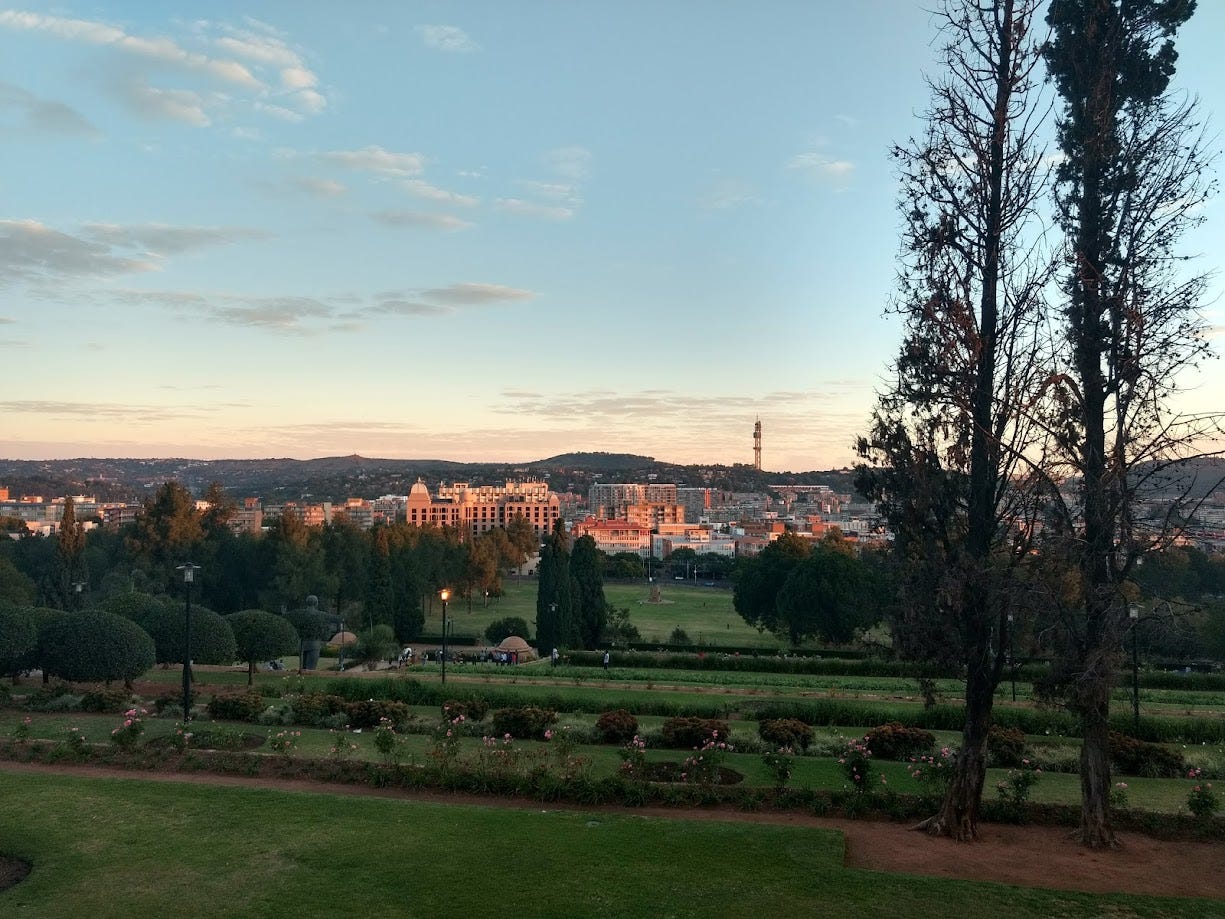
There was very little sleep on that trip, and black cats and monkeys at hotels, and apartheid museums and constitutional courts with the room built to look like it was under a great tree, and children in schools in their grey skirts and navy sweaters, dancing. I kept a journal, which is the only reason I remember the name of the girl I sat next to at the school in Section 10 of the Alexandra township. Her name was Lillian, and she was fourteen and her birthday was July 11 and she wanted to be a gynecologist when she grew up. She taught me how to say a few things in Sepedi (her native language), like hello (dumela) and how are you (O kae?), and in Zulu, one of the more common languages (sawubona means hello). I will probably never see her again.
There were so many places and people from that time that I will probably never see again in my life. It’s only looking back that I realized what everyone meant when they said to do these things in college. It’s not that I couldn’t go back now. It’s that I wouldn’t. Even if I wasn’t dealing with chronic health issues, I am no longer the kind of person who would go to South Africa and eat bugs and sleep four hours a night and rattle around on a bus for a week with forty other exhausted college kids and several delighted college professors reliving their favorite sabbaticals. But I’m so glad I did it, and it makes me wonder about all of the things I am missing out on, by being the person I am. A cautious, comfort-focused, ease-centric person. Somebody who doesn’t take risks, or steps into the unknown very often. Somebody who I would consider to be a coward, in the most neutral sense of the term. I am not very brave, I am actually very much the opposite. But I wasn’t this way in college, because I hadn’t yet decided on the kind of adult I was going to be. Or to be more specific- real adult life hadn’t yet struck me like a slap on the face, and made me shrink back into the analgesic of everything that could make me feel better, and deteriorated my capacity to be open to new experiences. In college I was okay with discomfort.
Senior year I watched the music department crumble from within, as half of the administration turned on our beloved choir professor who had taken us to South Africa. He was tenured but they forced him out anyway, and I watched professors I respected come to the wrong conclusions- take the twisted facts that they had been presented with and decide he had been some sort of villain. I knew the truth and I lost any remaining veneer of certainty that the grownups would know what to do, or that things would just work out. He and his wife (one of the kindest, gentlest, most badass ladies I’ve ever met7) were essentially fired and forced out of town and it cast a huge pall on the year. We protested and tried to make a difference and got on TV, and none of it mattered. It was a preview to so many things, that senior year just before Covid, before BLM and the second Trump administration and ICE and the fall of democracy.
I learned to work hard even when I was tired, and to turn in something that wasn’t entirely garbage on a tight deadline. I took out a scary amount of student loans that I am still paying back. I wore goofy outfits and did pink hair and pink eyebrows, and talked to friends in a Miranda-Sings voice. I read books that made me feel like an explorer at the bottom of a mountain, raring to climb. I learned grammar tricks like diagramming sentences and how to never use the wrong version of few vs less.8 I met a boy with collared shirts and a lot of hard math books and we flirted long distance across one summer, and then ran around together senior year before moving in after graduation, with six quiet months taking in our new city of adulthood before Covid hit. I took a much needed break from religion, but told God I’d be back. I went on a lot of late night donut runs.

What did you learn from college? What do you remember about that time in your life? Let me know in the comments. I hope you have a great weekend!
Thanks Rhoda!
Merci Brigitte et Erin et Joshua !
Thanks Pablo!
Gracias Daniel y Melissa!
Thanks Julie and Linda and Matt!
Townships are South African segregated shantytowns, created during apartheid to house black South Africans.
Thank you Brad and Jen <3
Fewer is for things that are countable, less is for things are uncountable. There are fewer people, there are fewer eggs. There’s less love, there’s less water. Thanks again Rhoda.


